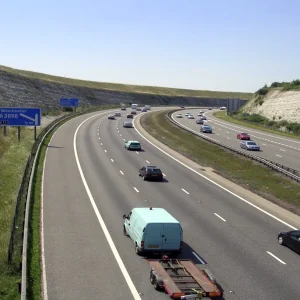
The UK, like many parts of the world, is experiencing an increase in extreme weather events due to climate change. These events, including floods, heavy snowfall, and heatwaves, are not only impacting daily life but also having profound effects on various industries. One sector that is feeling the brunt of these changes is the van and light commercial vehicle (LCV) market. This article delves into the impact of extreme weather on the UK’s van and LCV market, examining the challenges faced by the industry, the economic implications, and the adaptive measures being implemented.
The Rise of Extreme Weather Events in the UK
The frequency and intensity of extreme weather events in the UK have been rising over the past few decades. According to the Met Office, the UK has experienced its ten warmest years on record since 2002, with notable heatwaves in 2018 and 2019. Similarly, heavy rainfall and flooding events, such as those in 2015-2016 and February 2020, have become more common. These changes are attributed to global climate change, which has led to warmer temperatures and altered precipitation patterns.
Challenges Faced by the Van and LCV Market
- Damage to Vehicles Extreme weather events can cause significant damage to vans and LCVs. Flooding, for instance, can lead to water ingress, damaging engines and electronic systems. Prolonged exposure to high temperatures can degrade vehicle components, while heavy snowfall and ice can lead to accidents and increased wear and tear. Such damages not only lead to costly repairs but also result in downtime for businesses that rely on these vehicles for operations.
- Operational Disruptions Severe weather conditions often disrupt logistics and transportation. Flooded roads, snow-covered routes, and heat-damaged infrastructure can halt delivery schedules and affect the reliability of services. For businesses that depend on timely deliveries, such disruptions can lead to customer dissatisfaction and loss of revenue. Furthermore, unpredictable weather patterns make it challenging to plan and optimise routes effectively.
- Insurance Costs The increase in extreme weather events has led to a rise in insurance claims for vehicle damages. Consequently, insurance premiums for vans and LCVs have been escalating. Higher premiums add to the operational costs for businesses, making it more expensive to maintain a fleet of commercial vehicles. In some cases, insurance companies may even refuse coverage in high-risk areas prone to flooding or other severe weather conditions.
- Supply Chain Vulnerabilities The van and LCV market is also impacted by disruptions in the supply chain caused by extreme weather. For instance, heavy rains and floods can damage manufacturing facilities or delay the delivery of essential parts and components. Such disruptions can slow down vehicle production and availability, affecting the supply side of the market. Additionally, weather-related damage to infrastructure, such as roads and bridges, can further hinder the movement of goods and services.
Economic Implications
The economic impact of extreme weather events on the van and LCV market is multifaceted. The direct costs include vehicle repairs, increased insurance premiums, and loss of business due to operational disruptions. Indirectly, these events can affect the broader economy by disrupting trade and commerce.
- Increased Operating Costs The additional costs associated with vehicle repairs and maintenance, higher insurance premiums, and disruptions in operations can significantly increase the operating costs for businesses. Small and medium-sized enterprises (SMEs), which often have tighter budgets, are particularly vulnerable to these cost increases. The need for frequent repairs and replacements can strain financial resources and impact profitability.
- Impact on Business Continuity For many businesses, especially those in the delivery and logistics sector, vans and LCVs are crucial for daily operations. Extreme weather events that lead to vehicle downtime can severely impact business continuity. Missed deliveries and service delays can result in lost contracts and diminished customer trust. In the competitive market landscape, such disruptions can have long-term consequences for business sustainability.
- Market Dynamics The increased risks and costs associated with extreme weather events can influence market dynamics. For instance, businesses may delay or reduce investments in new vehicles, leading to a slowdown in market growth. Additionally, there may be a shift towards more resilient and weather-resistant vehicle models, driving innovation in the sector. Manufacturers that can offer robust, weather-proof vehicles may gain a competitive edge in the market.
Adaptive Measures and Industry Response
Despite the challenges, the van and LCV market in the UK is taking steps to adapt to the changing climate. Several strategies are being implemented to mitigate the impact of extreme weather events and enhance resilience.
- Investing in Weather-Resilient Vehicles Manufacturers are increasingly focusing on developing vehicles that can withstand extreme weather conditions. Innovations include improved water-sealing techniques, enhanced cooling systems, and robust materials that can endure high temperatures and heavy snow. Electric vehicles (EVs) are also being designed with better battery management systems to cope with temperature variations.
- Advanced Route Planning and Technology Businesses are leveraging technology to improve route planning and optimise logistics. Advanced GPS systems and weather forecasting tools enable companies to anticipate weather-related disruptions and adjust routes accordingly. By integrating real-time data, businesses can make informed decisions to avoid high-risk areas and minimise delays.
- Enhanced Maintenance and Preparedness Regular maintenance and proactive measures are crucial for ensuring vehicle reliability during extreme weather. Businesses are adopting stringent maintenance schedules, focusing on key components such as brakes, tyres, and electrical systems. Additionally, driver training programmes are being implemented to enhance preparedness for adverse weather conditions. Educating drivers on safe driving practices during floods, snow, and heatwaves can reduce the risk of accidents and damage.
- Collaboration with Insurance Providers Engaging with insurance providers to develop tailored policies that address the specific risks associated with extreme weather can help manage costs. Some insurance companies offer incentives for businesses that implement risk mitigation measures, such as installing tracking systems or adhering to strict maintenance schedules. By working closely with insurers, businesses can secure more favourable terms and reduce financial burdens.
Government and Policy Initiatives
The UK government and regulatory bodies are also playing a vital role in addressing the impact of extreme weather on the van and LCV market. Various initiatives and policies are being introduced to support the industry and promote resilience.
- Infrastructure Improvements Investing in resilient infrastructure is crucial for mitigating the impact of extreme weather. The government is focusing on upgrading roads, bridges, and drainage systems to better withstand floods and heavy rainfall. Improved infrastructure not only ensures smoother transportation but also reduces the risk of vehicle damage and operational disruptions.
- Support for Innovation and Research The government is encouraging innovation and research in the automotive sector to develop weather-resistant technologies. Grants and funding programmes are available for manufacturers and researchers working on solutions to enhance vehicle resilience. These initiatives aim to foster a competitive and innovative market that can adapt to the challenges posed by climate change.
- Regulatory Measures Implementing and enforcing regulations related to vehicle safety and emissions can also contribute to resilience. Standards for vehicle construction and maintenance are being updated to address the impact of extreme weather. Additionally, policies promoting the adoption of electric and low-emission vehicles are being prioritised to reduce the environmental impact and enhance sustainability.
Conclusion
The increasing frequency and severity of extreme weather events in the UK pose significant challenges to the van and light commercial vehicle market. From vehicle damage and operational disruptions to rising insurance costs and supply chain vulnerabilities, the impacts are far-reaching. However, the industry is responding with adaptive measures, including the development of resilient vehicles, advanced route planning, enhanced maintenance practices, and collaboration with insurance providers.
Government initiatives, such as infrastructure improvements, support for innovation, and regulatory measures, are also playing a crucial role in promoting resilience. As the climate continues to change, the van and LCV market must remain agile and proactive in addressing these challenges to ensure business continuity and sustainability. Through collaboration and innovation, the industry can navigate the impacts of extreme weather and continue to thrive in an increasingly unpredictable environment.





